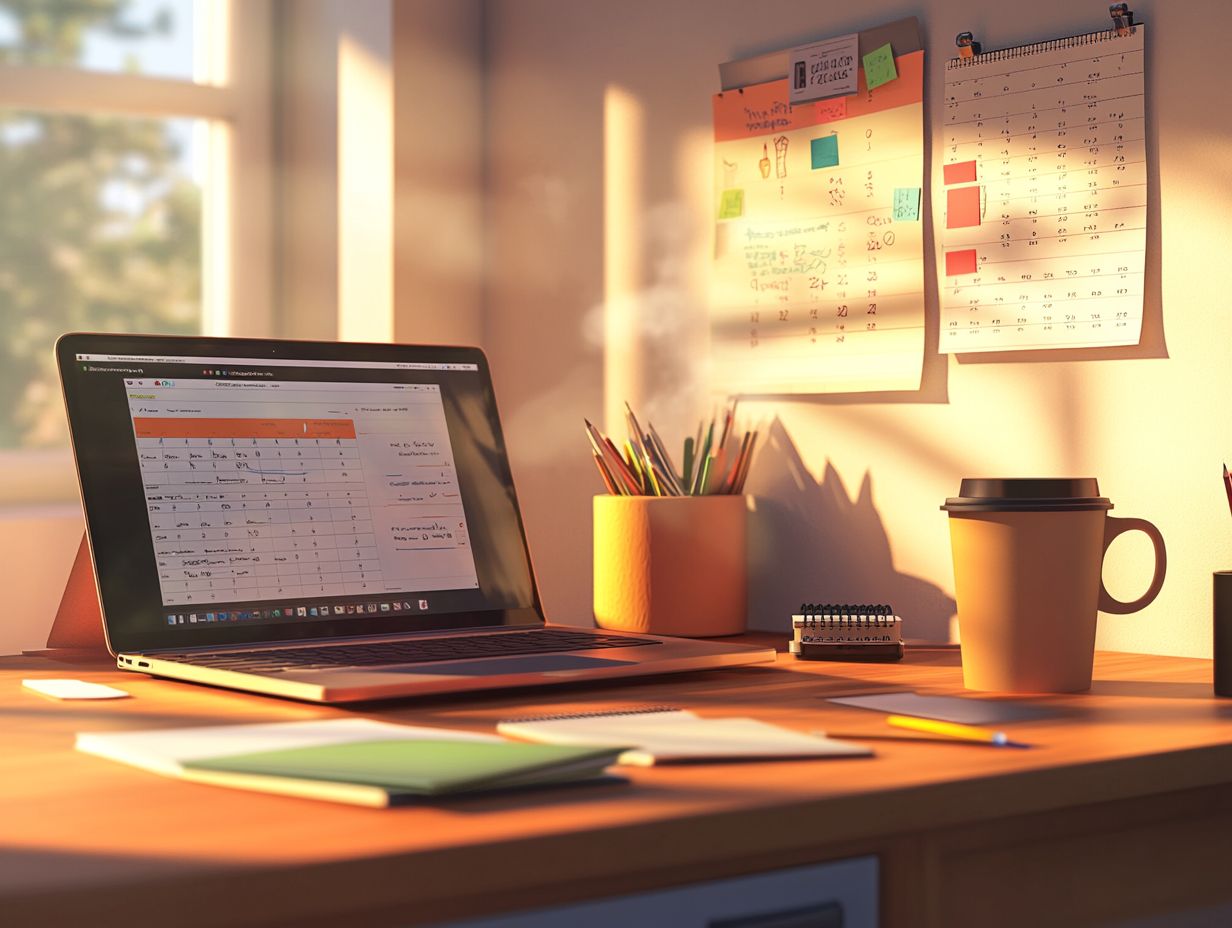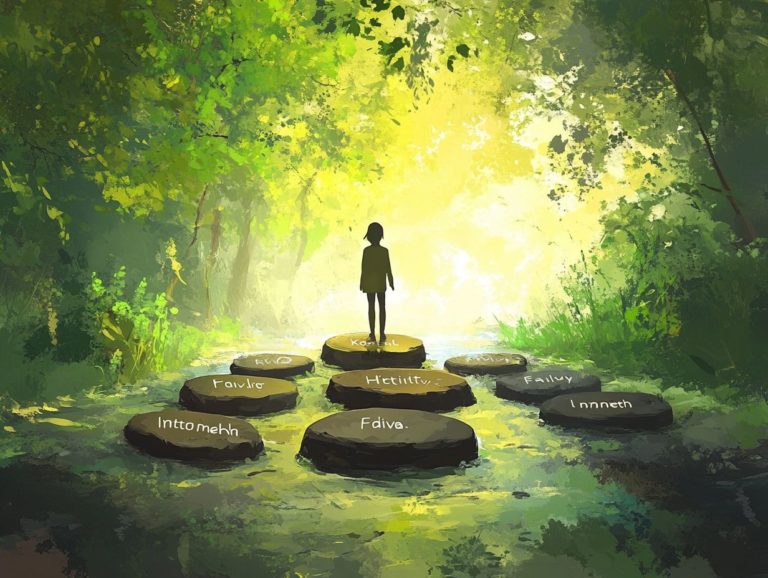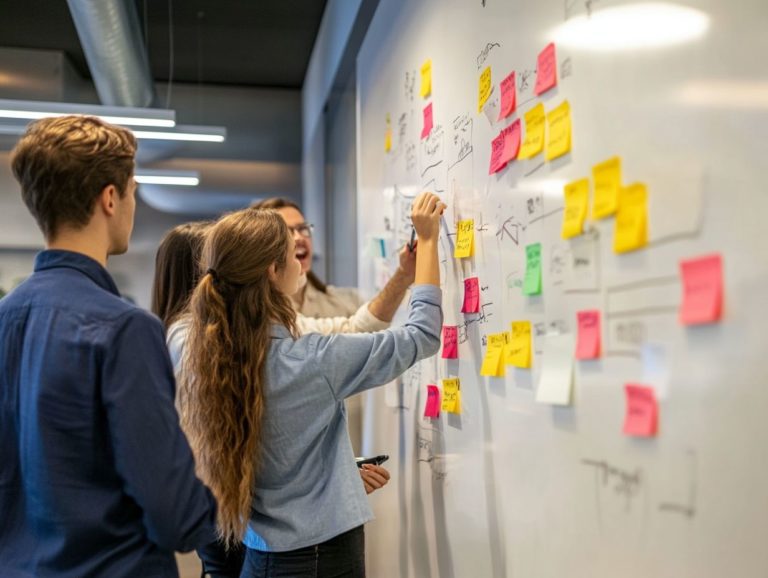Strategies for Prioritizing Personal Projects
Personal projects offer a remarkable opportunity to delve into your passions, refine your skills, and discover fulfillment beyond the confines of your daily routine.
Recognizing what defines a personal project and its significance is your first step toward maximizing your time and energy effectively.
This article will guide you through the myriad benefits of prioritizing these projects, the essential factors to consider, effective organizational strategies, and motivational tips to keep you inspired.
Whether your goal is to enhance productivity or to simply relish your pursuits, get ready to uncover exciting insights that will elevate your experience!
Contents
Key Takeaways:

- Prioritizing personal projects leads to increased productivity and satisfaction in achieving personal goals.
- Time constraints and personal goals should be considered when deciding which projects to prioritize.
- Effective strategies for prioritizing include organizing and ranking projects based on importance and urgency.
Understanding Personal Projects
Grasping the significance of personal projects is crucial for game designers and creatives alike. It gives you the power to explore your unique ideas while remaining true to your values and the overarching purpose of your organization.
Whether you’re creating a role-playing game like Dungeons and Dragons or developing innovative projects for Kickstarter, acknowledging the value of personal projects can profoundly enhance your decision-making and time management skills.
By mapping your values and evaluating project dependencies, you can adeptly prioritize the initiatives that promise the greatest business value and resonate with your long-term aspirations.
Defining Personal Projects and Their Importance
Personal projects are your individual creative pursuits that resonate deeply with your values and aspirations. They play a vital role in enhancing your emotional fulfillment and professional growth.
These endeavors act as a canvas for your self-expression and exploration. They allow you to showcase your unique talents while fostering connections with like-minded individuals.
Grasping the project scope is crucial; it helps you define your objectives clearly, manage your resources effectively, and stay focused, even when emotional conflicts may arise during your creative journey.
Whether you re grappling with the frustration of creative blocks or celebrating the joy of breakthroughs, navigating these emotional highs and lows can bolster your resilience.
Ultimately, personal projects aren t solely about your individual gain; they cultivate valuable relationships that can lead to collaborative opportunities, enriching both your personal and professional life.
Benefits of Prioritizing Personal Projects
By prioritizing personal projects, you not only enhance your productivity but also nurture your creativity and satisfaction through using a daily planner for prioritization.
Engaging in work that resonates with your core values and aspirations can lead to a more fulfilling and enriched experience.
Increased Productivity and Satisfaction

Increased productivity and satisfaction are direct results of prioritizing personal projects, allowing you to dedicate time to endeavors that truly resonate with your personal motivations.
By immersing yourself in creative practices that genuinely inspire you, you’ll often unlock new levels of focus and joy that can positively impact other areas of your life.
Investing time in these pursuits not only refines your skills but also fosters a deeper sense of purpose.
Making intentional commitments whether it s carving out a few hours each week or establishing specific milestones can significantly align these projects with your overarching goals.
This thoughtful engagement gives you the power to explore your passions, ultimately leading to greater fulfillment and an impressive boost in overall productivity.
Factors to Consider When Prioritizing
When you prioritize personal projects, it’s crucial to take into account several factors, such as time constraints, the potential impact on all stakeholders involved, and the role of prioritization in time management, including project dependencies.
Start your personal project today, and unlock your full potential!
Time Constraints and Personal Goals
Time constraints are a crucial factor when prioritizing personal projects. They directly influence your ability to achieve personal and business goals.
Managing these limitations requires strategic planning. Understand how your projects fit with your responsibilities.
Focus on creating a realistic project timeline. Balance urgent tasks with long-term aspirations.
By making conscious decisions about your commitments, you can direct your efforts toward what truly matters. This will boost your productivity and help your personal projects align with your essential business goals.
Effective Strategies for Prioritizing
Using effective strategies to prioritize your personal projects can elevate your decision-making. This approach not only ensures your actions align with your core values but also resonates with the art of effective prioritization in life and your business objectives.
Methods for Organizing and Ranking Projects

Organizing your projects means looking at how they depend on one another. Understanding these connections can simplify your decision-making.
Evaluate how tasks relate to determine which need immediate attention. This helps optimize your time and strengthens key business relationships.
Tools like Gantt charts or Kanban boards offer visual support. They help your team see dependencies clearly and prioritize projects effectively.
Tips for Staying Motivated and Focused
Staying motivated on personal projects can be challenging, especially with distractions everywhere. However, practical strategies can empower you to overcome these obstacles.
Overcoming Procrastination and Distractions
Overcoming procrastination is essential for maintaining productivity. It helps you achieve emotional balance while working on personal projects.
In our fast-paced world, it s easy to get distracted by various demands and digital interruptions. You might face emotional conflicts that slow your progress and affect your creativity.
Implement productivity strategies like setting specific goals. Breaking tasks into smaller steps can make challenges easier to manage.
Recognizing the importance of deadlines and accountability can foster a sense of ownership and motivation. This leads to a more fulfilling creative journey!
Frequently Asked Questions
What are some strategies for prioritizing personal projects?

1. Make a list of all your personal projects: Start by writing down all the projects you want to work on, big or small. This will give you a clear overview of what needs to be done.
2. Consider the urgency and importance: Prioritize projects based on their urgency and importance. This will help you focus on the most critical tasks first.
3. Use the “Eisenhower Matrix”: This method helps you categorize tasks into four sections: urgent and important, important but not urgent, urgent but not important, and neither urgent nor important. This makes it easier to prioritize them.
4. Set realistic deadlines: Assign a deadline to each project and ensure it is achievable. This will help you stay motivated and complete tasks on time.
5. Break down larger projects into smaller tasks: If you have a big project, break it down into smaller, manageable tasks. This will make it less overwhelming and easier to prioritize.
6. Re-evaluate and adjust regularly: Priorities can change, so it’s essential to regularly review and adjust your project list. This will ensure that you are focusing on the most relevant tasks.
How can I manage my personal projects effectively?
1. Use a project management tool: Consider using a project management tool to keep track of all your projects, tasks, and deadlines. This will help you stay organized and focused.
2. Prioritize tasks based on your goals: Your personal projects should align with your goals. Focusing on tasks that help you achieve these goals is crucial, as outlined in the importance of prioritization in work-life balance, and brings you closer to your desired outcomes.
3. Set aside dedicated time for each project: Block out time on your schedule for specific projects. This ensures that you have designated time to work on them without getting distracted by other tasks.
4. Avoid multitasking: Working on multiple projects simultaneously can decrease productivity and quality. Focus on one project at a time and give it your full attention.
5. Delegate tasks if possible: If you have too many projects on your plate, consider delegating some tasks to others. This will lighten your workload and allow you to focus on more critical tasks.
6. Take breaks and prioritize self-care: Don t let your projects consume you make self-care a priority! Taking breaks boosts your creativity and energy.
Why is it essential to prioritize personal projects?
1. Effective time management: Prioritizing personal projects allows you to manage your time more effectively. For busy professionals, implementing the top 10 prioritization techniques ensures that you focus on the most critical tasks and don’t waste time on less important ones.
2. Increased productivity: By prioritizing projects, you can focus on one task at a time and give it your full attention. This leads to greater productivity and better quality work.
3. Accomplish goals: Prioritizing helps you stay on track and work towards your goals. Completing important tasks first allows you to achieve your desired outcomes more efficiently.
4. Reduce stress: Working on all your personal projects at once can be overwhelming and lead to stress. Prioritizing helps you break down tasks and focus on one at a time, reducing stress levels.
5. Improve decision-making: When you prioritize personal projects, you have a clear understanding of what needs to be done first. This helps you make better decisions and avoid feeling overwhelmed or indecisive.
6. Create a sense of accomplishment: Prioritizing and completing tasks can give you a sense of accomplishment and motivate you to continue working on your projects.
How do I stay motivated while working on personal projects?
1. Set clear and achievable goals: Having clear and achievable goals will give you a sense of direction and motivate you to work towards them.
2. Reward yourself: Set small rewards for yourself after completing important tasks or reaching milestones. This will help drive your motivation to continue working on your projects.
3. Keep track of progress: Track your progress and celebrate small wins. This gives you a sense of accomplishment and motivates you to keep going.
4. Take breaks: Taking breaks while working on personal projects is crucial. This helps you avoid burnout and maintain motivation.
5. Surround yourself with like-minded people: Connect with others who have similar goals and are working on personal projects. This can provide support, motivation, and accountability.
6. Remind yourself of the “why”: When you feel demotivated, recall why you started these projects in the first place. This can reignite your motivation and drive.
How can I balance personal projects with other responsibilities?
1. Focus on what s urgent and important. Delegate tasks when you can to lighten your load.
2. Learn to say no. This keeps you from feeling overwhelmed.
3. Create a specific time in your day for personal projects. This ensures they get the attention they deserve.
4. Manage your time wisely. Stick to a routine to stay on top of everything.
5. Let people know your availability. Clear communication prevents misunderstandings.
6. Take time for yourself! It helps you relax and recharge.
By following these steps, you can find that perfect balance and make time for what you love!






